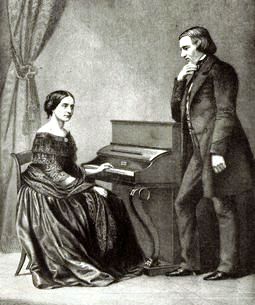
Chamber Orchestra's Affairs of the Heart
Robert Schumann and Clara Wieck, an uncommon love story.

That was the theme of the Cincinnati Chamber Orchestra’s first concert of the season, “Affairs of the Heart.” It was a singular date too, October 10, 2010, or 10/10/10, an alignment that happens only once a century.
There were two
performances, the first in Memorial Hall downtown, the second at Anderson
Center in Anderson Township. Both were
conducted by CCO music director Mischa Santora and featured pianist Anne-Marie
McDermott in Schumann’s Piano Concerto in A Minor.

Having been unable to attend the Memorial Hall concert, I headed for Five-Mile Road in Anderson. The theater at the Anderson Center is most congenial for chamber concerts, with good acoustics, unimpeded sight lines and comfortable seats. The house, an intimate one seating 200, was full, and one had the feeling that the CCO’s suburban audience is a committed and enthusiastic one.
The program was all-Schumann in honor of the composer’s bicentennial (he was born in 1810 and died tragically at age 46). The program was abbreviated, the usual format for CCO concerts at Anderson Center, comprising the Piano Concerto in A Minor and selections from “Carnaval” (heard in its entirety at Memorial Hall earlier in the day) in sparkling arrangements by Russian composers Alexander Glazunov, Nikolai Rimsky-Korsakoff, Anatoly Liadov, Alexander Tcherepnin and others (originally for a 1910 ballet by Sergei Diaghilev of the Ballets Russes). Joining Santora and the orchestra in “Carnaval” were local actors Charlie Clark and Alison Vodnoy, who recited excerpts from Schumann and Clara Wieck's letters to each other between movements.
Composed when Schumann was 24, “Carnaval” is subtitled “Pretty Scenes on Four Notes.” The notes, A, E-flat, C and B, used as thematic material throughout, correspond to the letters A-S-C-H in German. (Asch was the hometown of Schumann’s fiancée at the time, Ernestine von Fricken, and the letters also appear in Schumann’s last name and in the German word for “carnival,” Fasching). “Carnaval” depicts characters at a masked ball on the eve of Lent, including Pierrot, Arlequin, Pantalon and Colombine of the Italian commedia dell’arte; Eusebius and Florestan, the twin aspects of Schumann’s personality; Ernestine, Clara Wieck (later Clara Schumann), Chopin, Paganini and others.
“Carnaval” takes on evocative colors in orchestration -- violin and viola solos in “Eusebius” (Schumann’s reflective alter ego), silvery glockenspiel in “Papillons” (“Butterflies”), clarinet and harp in the mystical “Chopin.” where Clara asks Robert, who is far away, to play the same music as she at the same hour of night on a certain day. Robert and Clara’s words, as engagingly delivered by Clark and Bodnoy, gave enhanced meaning to the music, as they echoed their growing love for each other (this concert and upcoming CCO concerts in November are entitled “Affairs of the Heart”). Four of the 21 numbers in “Carnaval” were cut from Sunday evening’s performance, including “Pantalon et Colombine” and “Paganini,” but the cumulative effect of looking into the hearts of the young lovers and hearing their thoughts in words and music was totally charming.
McDermott, who performed two of Clara Schumann’s compositions for piano on the Memorial Hall program, made the ideal soloist. She might have been Clara herself, one of the 19th century’s great piano virtuosos, who premiered her husband’s work in 1845. The Schumann Concerto is one of the loveliest of all piano concertos, flush with melody and rewarding listening for both its soloistic and orchestral aspects. McDermott glided smoothly over the keyboard one moment and dig into the keys for a more percussive effect at others. Above all, her performance was intensely romantic, and she mined the work’s melodic riches to heart-squeezing effect. The opening bars of the middle movement (Intermezzo) had a gentle, almost tentative effect with soloist and musicians imitating one another until preempted by the cellos’ ravishing theme. There was a feeling of giddy excitement in the finale, with its rapid, sequencing passages.
The Anderson crowd awarded McDermott with a warm standing ovation (there was an encore at the Memorial Hall concert, which was omitted here).
The CCO’s next concerts, to be led by Mischa Santora, are Nov. 14 at Memorial Hall and Nov. 21 at the Anderson Center and will explore the friendship between Schumann and Brahms. Guests will be alto Catherine Keen in Brahms’ Alto Rhapsody (Nov. 14 only) and the Vocal Arts Ensemble in his “Liebeslieder Waltzes.” Framing the concert will be Schumann’s Overture, Scherzo and Finale, Op. 52, and Brahms’ Hungarian Dances No. 5, 6 and 7.
For information and tickets, call (513) 723-1182 or visit www.ccocincinnati.org